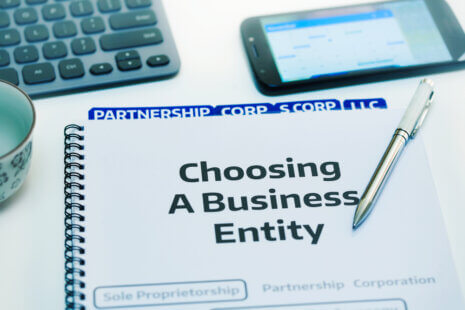The choice of business entity for tax purposes depends on various factors, including your business’s size, structure, income, goals, and the specific tax advantages and disadvantages you seek.
Here’s a brief overview of different business entities and their tax implications:
- Sole Proprietorship:
- Simplicity: Sole proprietorships are straightforward and require no separate tax filing. Business income and expenses are reported on your personal tax return (Form 1040).
- Tax Benefits: You can potentially deduct business losses on your personal tax return, which can offset other income.
- Disadvantages: You are personally liable for business debts, and there are no corporate tax benefits.
- Limited Liability Company (LLC):
- Pass-Through Taxation: LLCs are typically taxed as pass-through entities, meaning business income and losses “pass-through” to the owners’ personal tax returns. This can simplify tax reporting.
- Flexibility: LLC owners (members) can choose how they want to be taxed. They can elect to be treated as a sole proprietorship, partnership, S corporation, or C corporation for tax purposes.
- Limited Liability: LLCs offer personal liability protection, separating business debts from personal assets.
- Partnership:
- Pass-Through Taxation: Like LLCs, partnerships are pass-through entities, with income and losses passing through to partners’ personal tax returns.
- Multiple Owners: Partnerships are suitable for businesses with multiple owners, and they offer flexibility in allocating profits and losses among partners.
- S Corporation:
- Pass-Through Taxation: S corporations also pass through income and losses to shareholders’ personal tax returns.
- Self-Employment Taxes: S corporation owners can potentially reduce self-employment taxes because only wages paid to owners are subject to them, not the entire income.
- Eligibility Requirements: S corporations have specific eligibility criteria, such as a limited number of shareholders and U.S. residency requirements.
- C Corporation:
- Corporate Taxation: C corporations are subject to corporate income tax. They file a separate tax return (Form 1120), and profits are taxed at the corporate level.
- Double Taxation: Shareholders are also subject to taxes on dividends received, resulting in potential double taxation of corporate profits.
- Tax Planning: C corporations offer more flexibility in tax planning, including the ability to retain earnings for growth.
- Professional Corporation (PC) or Professional Limited Liability Company (PLLC):
- Suitable for Licensed Professionals: These structures are typically for licensed professionals like doctors, lawyers, and accountants.
- Liability Protection: They offer liability protection for professional malpractice claims while allowing pass-through taxation.
The best business entity for tax purposes depends on your specific circumstances and objectives. It’s essential to consult with a tax advisor or accountant who can assess your situation and provide personalized recommendations. Keep in mind that tax considerations are just one aspect to weigh when choosing a business entity; legal liability, management structure, ease of operation, and other factors should also be taken into account.




